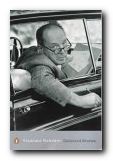a critical examination of Nabokov’s collected stories
 ‘Tyrants Destroyed’ (June 1938) was a twin to ‘Cloud, Castle, Lake’ but took quite a different narrative approach to the same theme. In this story, Nabokov returns to the Dostoyevskian form of the quasi-philosophic monologue – the outpouring of rage, frustration, and neurosis which pretends to no particular structure, does away with characterisation and plot, and concentrates on an idea; in this case, the hatefulness of tyrants.
‘Tyrants Destroyed’ (June 1938) was a twin to ‘Cloud, Castle, Lake’ but took quite a different narrative approach to the same theme. In this story, Nabokov returns to the Dostoyevskian form of the quasi-philosophic monologue – the outpouring of rage, frustration, and neurosis which pretends to no particular structure, does away with characterisation and plot, and concentrates on an idea; in this case, the hatefulness of tyrants.
The unnamed narrator is a typical man-from-underground, a schoolteacher who has led ‘a hard, lonely life, always indigent, in shabby lodgings’ (TD,p.6). He has become an insomniac and is totally obsessed with his hatred of his country’s dictator who he knew personally as a youth. This hatred has grown into a neurosis which obliterates everything else from his life.
The narrative takes the form of an analysis of dictators – their mediocrity, vulgarity, shabbiness, cruelty, and their moral degeneracy. Nabokov takes the fairly commonplace view that dictators are petty-bourgeois nonentities seeking revenge on others for their own shortcomings and what they perceive to be the injustices that life has meted out to them.
From a fictional point of view the problem is that this portrait is generalised rather than specific. The dictator is an identikit figure, as Nabokov himself hints: ‘Hitler, Lenin, and Stalin dispute my tyrant’s throne in this story’ (p.2). Narrative interest therefore focuses not so much on the dictator as on the narrator himself and what he will do to overcome his obsession.
Fuelled by his hatred, he decides that the tyrant must die, but cannot bring himself to commit the act on the grounds that murder is a shabby, vulgar act only worthy of the very type he wishes to eliminate. Instead, in typically Dostoyevskian manner, he contemplates suicide: ‘By killing myself I would kill him, as he was totally inside me, fattened on the intensity of my hatred’ (p.33). But on re-reading the notes which constitute his narrative he feels that the mockery and scorn he has poured onto the dictator constitute a sort of triumph over him, and that they will exist to be of help to others in similar need: ‘This is an incantation, an exorcism, so that henceforth any man can exorcise bondage’ (p.36).
This is not an altogether convincing argument, but it is a neat resolution to the problem of the narrative itself. The story is another variation on the theme of Art transcending the vulgarities of human existence, but it is not one of his most convincing.
© Roy Johnson 2005
![]() Vladimir Nabokov: The Collected Stories – Amazon UK
Vladimir Nabokov: The Collected Stories – Amazon UK
![]() Vladimir Nabokov: The Collected Stories – Amazon US
Vladimir Nabokov: The Collected Stories – Amazon US
Vladimir Nabokov web links
Vladimir Nabokov greatest works
Vladimir Nabokov criticism
Vladimir Nabokov life and works